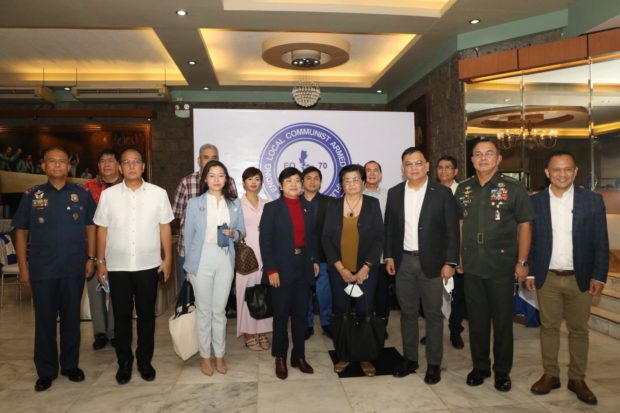
Members of the executive committee of the National Task Force to End Local Communist Armed Conflict gather together to have a group picture following their first meeting under a new administration held at Camp Aguinaldo on Friday, July 15, 2022. Photo from DND
MANILA, Philippines — The National Task Force to End Local Communist Armed Conflict (NTF-Elcac) on Friday said it is “not weaponizing” the Anti-Terrorism Act of 2020 (ATA).
The ATA, among the controversial legacies left behind by former President Rodrigo Duterte, is a highly contested law aimed at penalizing terrorists and terrorist organizations in the Philippines.
READ: It’s final: Only 2 portions of Anti-Terror Law are unconstitutional
In a press conference following the NTF-Elcac executive committee’s first meeting under the administration of President Ferdinand Marcos Jr., the anti-insurgency task force said that only those who commit an overt crime will be prosecuted under ATA.
“We’re not weaponizing the Anti-Terror Law,” National Commission on Indigenous People chairperson Allen Capuyan — a member of the NTF-Elcac executive committee — stressed. “The filing of cases proceeds a situation as conditions on the ground appear. I’d like to express that the NTF-Elcac has a balanced direction. For those who continue to fight the government, we have the strong hands of the law. But for those who want to go back to the mainstream, there is an amnesty program.”
Discussions on abolishing the ATA were fueled anew after three party-list lawmakers recently sought to repeal the law, saying it contravenes the country’s international commitment to uphold human rights.
Assistant Solicitor General Angelita Miranda, however, said that only those who have done an apparent crime will be apprehended under the said law.
“As long as you don’t [commit] an overt act, even [with] how evil your mind is, you cannot be prosecuted. So even if there’s the Anti-Terrorism Act of 2020, a person is safe unless he doesn’t convert that evil mind into action,” she further explained.
In late June, the government used the ATL to justify blocking access to 27 websites allegedly linked with the Communist Party of the Philippines (CPP), including several alternative news media outfits like Bulatlat and Pinoy Weekly.
Various groups and organizations have denounced the order, saying it “sets a dangerous precedent for independent journalism in the Philippines.”
RELATED STORIES:
Anti-Terror Law constitutional except for two parts, says SC
SC asked to ‘take an even closer look’ at Anti-Terrorism Act of 2020

